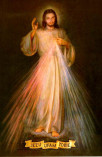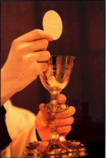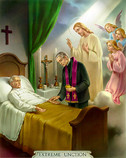Sacraments
There are Seven Sacraments of the Catholic Church. Each sacrament is an outward sign of an inward grace. They are the Life of the Church! When we participate in them worthily, each provides us with graces—with the life of God in our soul. In worship, we give to God that which we owe Him; in the sacraments, He gives us the graces necessary to live a truly human life.
The first three Sacraments—Baptism, Confirmation, and Holy Communion—are called the Sacraments of Initiation, because the rest of our life as a Christian depends on them. Below, you will find brief descriptions of each Sacrament, and the ways in which our Parish provides these to Parishioners. Please contact the Rectory for more information on the reception of the Sacraments for you, your child or a loved one.
Baptism
The Sacrament of Baptism, the first of the three sacraments of initiation, is also the first of the seven sacraments in the Roman Catholic Church. It removes the guilt and effects of Original Sin and incorporates the baptized into the Church, the Mystical Body of Christ on earth. Parents who are expecting a child must call the rectory for an appointment with a priest. Both parents must participate in a Baptismal Preparation Session. Godparents are to be Catholics in good standing. If the Godparents are not registered members of St. Adalbert Parish, they will need a sponsorship letter from the parish where they are registered.
Baptismal Preparation Class in Polish will take place in January, March, May, July, September, November.
Baptismal Preparation Class in English for parents and godparents are available in Nativity BVM parish on the 2nd Monday of each month at 7:00 PM in the Rectory. Please call
the Rectory @ 215-739-2735 from 8-4 up to the day before if you plan to attend.
Baptisms will ordinarily take place on Sundays at 1:00PM.
Confession / Sacrament of Penance
The reconciling of man to God is the purpose of Confession. When we sin, we deprive ourselves of God’s grace. And by doing so, we make it even easier to sin some more. The only way out of this downward cycle is to acknowledge our sins, to repent of them, and to ask God’s forgiveness. Then, in the Sacrament of Confession, grace can be restored to our souls, and we can once again resist sin.
Weekdays: 7:10AM
First Friday - Friday at 6:30 PM
Spowiedz w Pierwszy Piątek Miesiąca o godz.6:30 PM
Saturday/w Sobotę: - 4:00PM
Holy Eucharist
The Holy Eucharist is the most important of the seven sacraments because, in this and in no other sacrament, we receive the very body and blood, soul and divinity of Jesus Christ. Innumerable, precious graces come to us through the reception of Holy Communion.
Communion is an intimate encounter with Christ, in which we sacramentally receive Christ into our bodies, that we may be more completely assimilated into his. "The Eucharist builds the Church," as Pope John Paul II said (Redemptor Hominis 20). It deepens unity with the Church, more fully assimilating us into Christ (1 Cor. 12:13; CCC 1396).
The Eucharist also strengthens the individual because in it Jesus himself, the Word made flesh, forgives our venial sins and gives us the strength to resist mortal sin. It is also the very channel of eternal life: Jesus himself.
In John’s gospel, Jesus summarized the reasons for receiving Communion when he said:
"Truly, truly, I say to you, unless you eat the flesh of the Son of man and drink his blood, you have no life in you; he who eats my flesh and drinks my blood has eternal life, and I will raise him up at the last day. For my flesh is real food, and my blood is real drink. He who eats my flesh and drinks my blood abides in me, and I in him. As the living Father sent me, and I live because of the Father, so he who eats me will live because of me. This is the bread which came down from heaven, not such as the fathers ate and died; he who eats this bread will live forever" (John 6:53–58).
The Church sets out specific guidelines regarding how we should prepare ourselves to receive the Lord’s body and blood in Communion. To receive Communion worthily, you must be in a state of grace, have made a good confession since your last mortal sin, believe in transubstantiation, observe the Eucharistic fast, and, finally, not be under an ecclesiastical censure such as excommunication.
First, you must be in a state of grace. "Whoever, therefore, eats the bread or drinks the cup of the Lord in an unworthy manner will be guilty of profaning the body and blood of the Lord. Let a man examine himself, and so eat of the bread and drink of the cup" (1 Cor. 11:27–28). This is an absolute requirement which can never be dispensed. To receive the Eucharist without sanctifying grace in your soul profanes the Eucharist in the most grievous manner.
A mortal sin is any sin whose matter is grave and which has been committed willfully and with knowledge of its seriousness. Grave matter includes, but is not limited to, murder, receiving or participating in an abortion, homosexual acts, having sexual intercourse outside of marriage or in an invalid marriage, and deliberately engaging in impure thoughts (Matt. 5:28–29). Scripture contains lists of mortal sins (for example, 1 Cor. 6:9–10 and Gal. 5:19–21). For further information on what constitutes a mortal sin, see the Catechism of the Catholic Church.
Second, you must have been to confession since your last mortal sin. The Didache witnesses to this practice of the early Church. "But first make confession of your faults, so that your sacrifice may be a pure one" (Didache 14).
Third, you must believe in the doctrine of transubstantiation. "For anyone who eats and drinks without discerning the body eats and drinks judgment upon himself" (1 Cor. 11:29). Transubstantiation means more than the Real Presence. According to transubstantiation, the bread and wine are actually transformed into the actual body, blood, soul, and divinity of Christ, with only the appearances of bread and wine remaining. This is why, at the Last Supper, Jesus held what appeared to be bread and wine, yet said: "This is my body. . . . This is my blood" (Mark 14:22-24, cf. Luke 22:14-20). If Christ were merely present along side bread and wine, he would have said "This contains my body. . . . This contains my blood," which he did not say.
Fourth, you must observe the Eucharistic fast. Canon law states, "One who is to receive the most Holy Eucharist is to abstain from any food or drink, with the exception only of water and medicine, for at least the period of one hour before Holy Communion" (CIC 919 §1). Elderly people, those who are ill, and their caretakers are excused from the Eucharistic fast (CIC 191 §3). Priests and deacons may not dispense one obligated by the Eucharistic fast unless the bishop has expressly granted such power to them (cf. CIC 89).
Finally, one must not be under an ecclesiastical censure. Canon law mandates, "Those who are excommunicated or interdicted after the imposition or declaration of the penalty and others who obstinately persist in manifest grave sin are not to be admitted to Holy Communion" (CIC 915).
Provided they are in a state of grace and have met the above requirements, Catholics should receive the Eucharist frequently (cic 898).
Sacrament of Confirmation
The Sacrament of Confirmation confers special graces of the Holy Spirit upon the person being confirmed, just as such graces were granted to the Apostles on Pentecost. Like Baptism, therefore, it can only be performed once, and Confirmation increases and deepens all of the graces granted at Baptism.
Godparents for Baptism, Sponsors for Confirmation
Acting as a godparent for Baptism or as a sponsor for Confirmation is a honor and a responsibility.The Church does not take these roles lightly and has established clear criteria for the fulfillment of theseroles:1) Be at least 16 years old.2) Be a fully initiated Catholic (receivedBaptism, Confirmation and Eucharist).3) Lead a life in harmony with the faith androle of a sponsor (i.e. be a member of aparish, attend Mass on Sundays and holydays, not be in an irregular marriage, etc.) All these things should be taken into considerationwhen choosing a Sponsor.
Matrimony
Marriage, a lifelong union between a man and a woman for procreation and mutual support, is a natural institution. It reflects the union of Jesus Christ and His Church.
Diocesan rules require that a couple make arrangements for their marriage at least six (6) months before the date of the wedding.
Holy Orders
The Sacrament of Holy Orders is the continuation of Christ's priesthood, which He bestowed upon His Apostles; thus, the Catechism of the Catholic Church refers to the Sacrament of Holy Orders as the 'sacrament of apostolic ministry.' The term "Ordination" comes from the Latin ordinatio, which means to incorporate someone into an order. In the Sacrament of Holy Orders, a man is incorporated into the priesthood of Christ. There is only one Sacrament of Holy Orders, but on three levels: the episcopate (bishop), the priesthood (priest), or the diaconate (deacon).
Anointing of the Sick
Traditionally referred to as Extreme Unction or Last Rites, the Sacrament of the Anointing of the Sick is administered both to the dying and to those who are gravely ill or are about to undergo a serious operation, for the recovery of their health and for spiritual strength. |=| Please call the rectory to inform the priests of a serious illness or of the hospitalization of a parishioner so that the person may be visited by one of the priests as time permits and the person may be remembered in their prayers.







